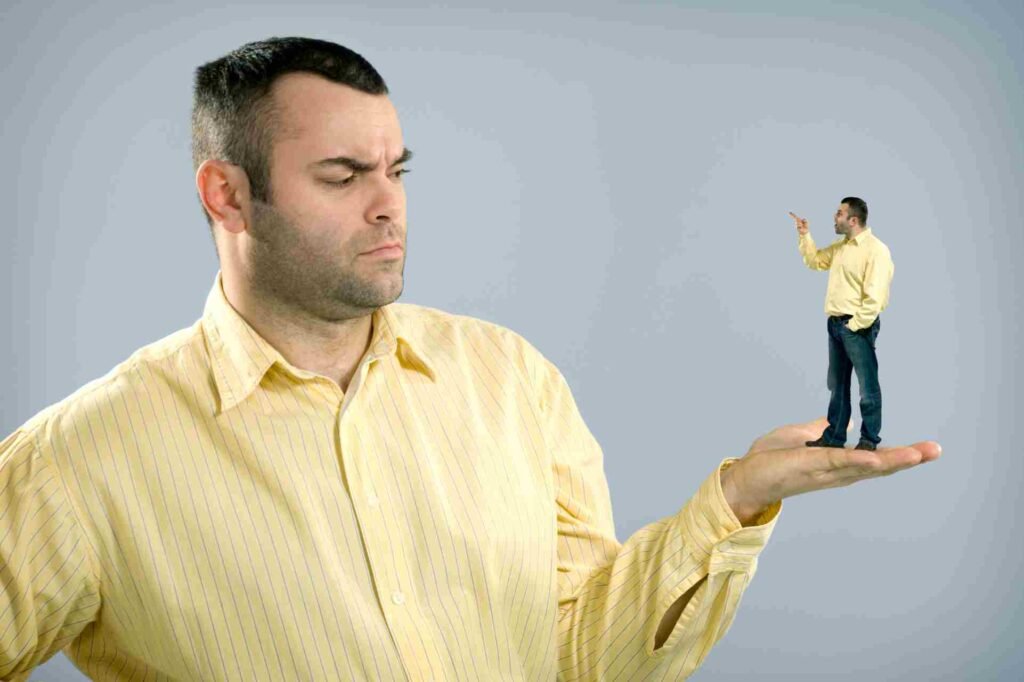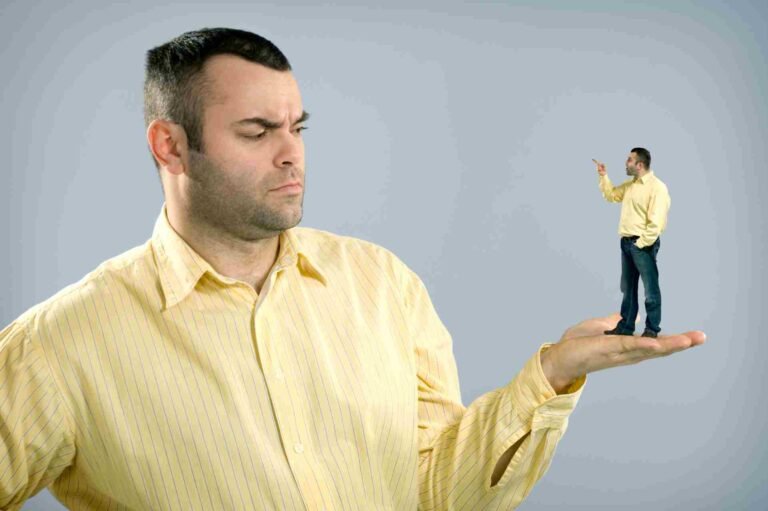
Jonathan Gravenor heard these exact words from his young daughter over dinner. And, it wasn’t just a random family quarrel.
That day was one of the toughest in Jonathan’s life. A few hours earlier, he was diagnosed with throat cancer. When he shared the bad news at home, this was the reaction he got from his little girl.
At first, it made him mad. How dare she say something like that? Couldn’t she see how much he’d done for her?
But over the following weeks, as he started his treatment, Jonathan’s anger gave way to something else. He started seeing that his success as a TV journalist, the money and trips he made with his daughter were superficial. They couldn’t make up for what he failed to establish with his child:
A sense of deep, meaningful connection.
During chemotherapy, Jonathan felt more scared than ever in his life. But despite the fear, he decided to go it alone. He couldn’t bring himself to ask his wife and daughter for support.
Unexpectedly, he received this support from a homeless man begging on the street.
Jonathan walked by him daily but, for the longest time, he avoided any contact. Eventually, they interacted. The man’s name was Doug.
Doug was very different from how Jonathan imagined homeless people. He opened up about his loneliness and schizophrenia. He shared whatever little he had with Jonathan, like a box of chocolates he got from someone. Eventually, Jonathan realized that Doug wasn’t begging — he was raising money for charities.
This led Jonathan to tell him about his cancer and, for the first time, admit just how afraid he was. Hearing this, Doug held his arm, looked into his eyes, and said with inexplicable confidence:
“You’re going to be okay. You have a lot more to do.”
That day, Jonathan knew he was going to live. Not because Doug was a fortune-teller. It was because the two men shared a connection so powerful that it caused Jonathan’s whole attitude to shift.
He was going to live because now, he had someone to do it for.
Connecting With Strangers Can Be Easier Than With Loved Ones
Have you ever experienced a sense of deep connection with someone you just met?
Maybe you found yourself sharing your deepest thoughts with a co-passenger on a train. Or, one summer night at a bonfire someone whose face you barely saw told you their entire life story.
Or you stopped by a homeless person to give them change — and suddenly realized that they were human, exactly like you.
Such experiences of connection aren’t rare. When you’re caught off-guard, without the need to protect your ego, you’re more likely to feel close to the person in front of you. Ironically, that’s often easier with people you barely know.
As Dan Munro put it, “You’re willing to lose the person because there is no relationship to be maintained — there’s nothing to lose.” When there are no strings attached, it’s often easier to be yourself. As a result, connection is born more naturally.
When I was going through difficulties in my last romantic relationship, I was sometimes more willing to open up to strangers than to my partner. In our arguments, I didn’t know how to be vulnerable. I felt the urge to maintain a certain image of myself.
I was afraid that if I showed my real face, he would leave. Today, I think we split largely because neither of us was willing to be vulnerable. This stopped us from creating the connection both of us yearned for.
I realized that connection and relationships don’t always go hand-in-hand. The latter without the former usually leads to pain.
Relationship and Connection Are Two Different Things
Dan Munro was right when he wrote that “we mistakenly see relationships as the source of connection.” I also used to believe this. If I spent long enough time with someone (e.g. my ex-boyfriend), I expected us to be connected by default.
Now I know that “relationship” isn’t synonymous with “connection.” Both can exist on their own, without the support of the other party.
Jonathan’s story shows that, despite having a relationship with his daughter, there was no connection between them. Sure, they had a history of shared experiences and father-daughter dynamics. But when Jonathan’s cancer challenged the family, their lack of closeness became painfully obvious.
A sense of connection outside a relationship is also possible. Jonathan experienced this with Doug and I’m sure you experienced it at least once in your life. Arthur Aaron even confirmed this scientifically. In his experiment, he generated “interpersonal closeness” between strangers in a lab setting.
Even without a relationship, a sense of connection could be induced between two people in as short as 45 minutes.
Aaron and colleagues later wrote:
“We think that the closeness produced in these studies is experienced as similar in many important ways to felt closeness in naturally occurring relationships that develop over time.”
Connection and relationship don’t always coexist. However, a connection without a relationship seems to be a much more positive experience than when it happens the other way around.
Feeling close to someone nurtures you regardless of whether you have a relationship with them. Remember the heart-warming moments Jonathan shared with Doug? That’s because true connection erases feelings of loneliness, even if it doesn’t last very long.
On the other hand, relationships without connection can frustrate us. Often, they’re based on unhealthy dependencies and insecurity which make people cling to each other. This kind of relationship doesn’t satisfy your deeper social needs.
In this sense, you may need genuine connection more than you need relationships.
3 Things To Leave Behind If You Want To Build Meaningful Connection
Creating a sense of connection often requires you to let go of certain behaviours, rather than looking for new ones. Personal closeness is about simplifying — not adding complexity to your interactions.
Jonathan needed to let go of his prejudice before he could get close with Doug. In the end, their connection resided in simplicity. When Jonathan later shared his story in front of an audience, he said:
“I think sometimes the best things are said when we don’t exchange words, we just exchange space.”
When comes to connecting with others, less is often more. Here are three things you may need to leave behind to get closer to someone.
Letting go of fear
Brené Brown says that “Vulnerability is the birthplace of love, belonging, joy, courage, empathy, and creativity.” It’s only when you allow others to see you that you have a chance for meaningful connection.
But to be seen feels scary. It certainly felt scary to Jonathan who couldn’t, even in the face of cancer, admit to his wife and daughter how much he was struggling. He didn’t allow them to see his real self. He only allowed this to Doug.
The simple act of vulnerability can open doors unavailable to us otherwise. You can’t connect with the appearances or masks that so many people chose to wear. You can only connect with imperfect, emotional, raw human beings.
Letting go of expectations
Jonathan expected his daughter to show gratitude for what he’d given her. When she didn’t, he got disappointed and ceased to communicate with her altogether.
With Doug, he didn’t expect anything. How could he? After all, this was just a homeless man who, as Jonathan thought, had nothing to offer him. When he first sat with Doug on a reversed milk crate, he did so out of curiosity.
Sometimes, you will feel connected to people, and other times you won’t. But when you expect nothing from an interaction, you allow anything to happen.
Letting go of judgment
In many relationships, you engage in subtle forms of judgment. It doesn’t always mean that you think poorly of the other person. But you often perceive them in a very specific, fixed way.
This causes you to see the person you expect to see — rather than who they really are.
Jonathan judged Doug because he was sure that he begged for money to buy alcohol or drugs. It was only after a few interactions that he realized how wrong he was. Doug was collecting money for charity — and a banner which stood next to him communicated that all along.
When you’re fixated on your mind’s projection, you can’t see the truth. Only by abandoning preconceived ideas you can become present, pay attention and connect with the person in front of you.
Prioritize connection over relationships
Jonathan’s illness was a much-needed wake-up call. It made him seek new ways to relate to others. Meeting Doug, he realized what he’s been missing all these years.
But one day, when Jonathan went to find Doug in their usual spot, the man was gone. The last words Jonathan ever heard from him were these:
“You’re going to be okay. You have a lot more to do.”
Telling this story in his TED Talk, Jonathan said:
“I had a lot more to do but that ‘a lot more to do’ wasn’t me saving other people. That ‘a lot more to do’ was me seeing other people, me receiving and in that, giving them the power to heal others. It also started me on the course of redemption in my life with my daughter.”
Jonathan discovered that relationships were useless when they were empty. Filling them with connection was the only way he could make them meaningful again.
He needed a life-threatening disease to teach him that. But you don’t have to experience cancer to understand the importance of connection. You’ve most likely already met your Doug. Deep down, you know what it takes to get close to someone.
Now it’s time to implement that knowledge. Don’t let the connection disappear from your life just because Doug has.
- Self Harm Awareness Ribbon Color: Unveiling Its Meaning - August 21, 2023
- What Is Emotional Self Awareness: A Guide to Inner Growth - August 21, 2023
- Self Harm Awareness Bracelets: Show Support and Share Hope - August 21, 2023

